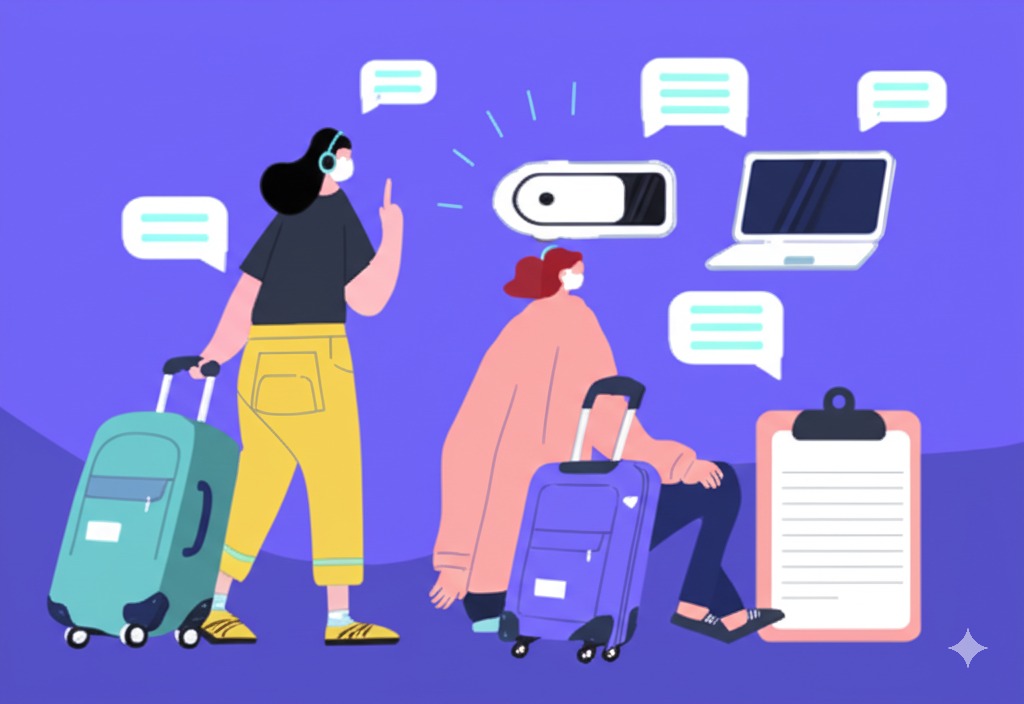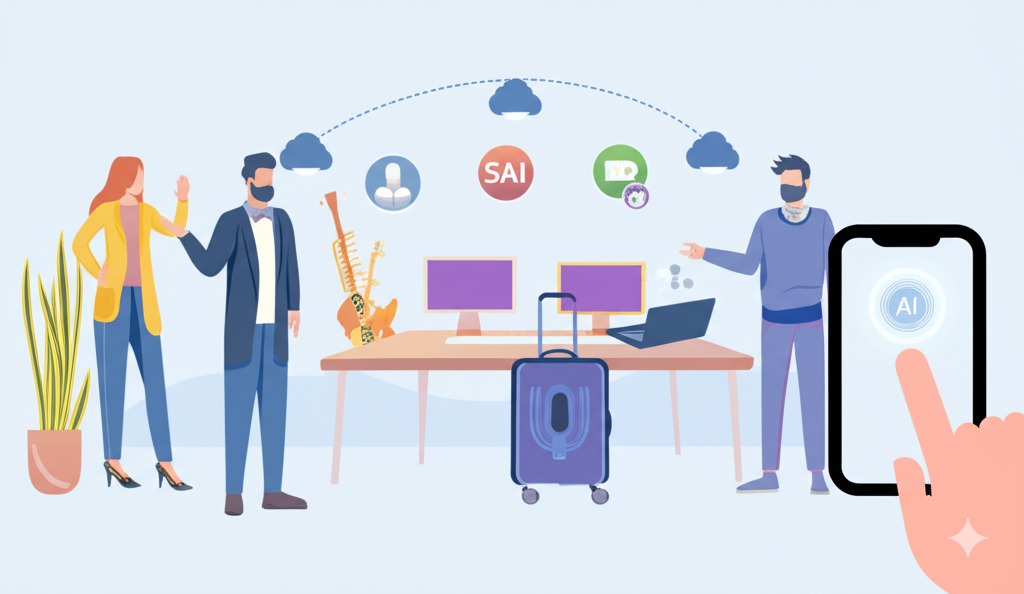
AI voiceovers for tourism are smart computer voices that translate tour information into any language you want.
Travel agencies love them because they don’t have to hire a bunch of translators just so visitors can understand what they’re seeing. No more tourists pretending to get it while understanding zero!
These AI voices tell everyone the interesting stories about famous spots in their own language. They play right on your phone, sound pretty close to real people, and can be fixed up quickly when facts change.
Small tour companies can now welcome travelers from anywhere without emptying their bank accounts. Think of it as having a knowledgeable friend in your pocket who speaks your language and knows all the details about where you’re visiting – from big attractions like the Eiffel Tower to those hidden gems most tourists never discover because of language problems.

Understanding AI Voice Technology in the Travel Industry
The Growth of Voice Technology in Tourism
AI in tourism industry has come a long way. Early computer voices sounded robotic and fake. Today’s AI voiceovers for tourism sound much more like real people. They can show emotion and even handle different accents. This makes them perfect for travel agencies that want to talk to customers from around the world without hiring lots of translators.
Travel agencies use AI for language translation in many ways. The big change is that these voices can now sound natural enough that tourists might not even notice they’re listening to a computer.
How AI Voiceovers Are Different from Old Audio Guides
Unlike old audio guides, AI voice translation for self-guided tourism can be made quickly when needed. Travel agencies can pick different voices, accents, and even how emotional they sound. When information changes, they can update all language versions right away.
The best part of AI voiceovers for tourism is that they work for almost any language. This makes them much cheaper and more useful than the old way of doing things. Small travel companies can now offer services in many languages, which was impossible before.
Key Benefits of AI Voiceovers for Travel Agencies
Cost Savings and Growth Opportunities
Using AI voiceovers for tourism cuts costs a lot compared to hiring real voice actors for many languages. A travel agency only needs to write one script, and the AI in tourism industry tools can turn it into many languages right away. This means even small travel businesses can serve people from all over the world.
Travel industry voice technology saves both time and money. Instead of weeks of recording with different voice actors, agencies can make new audio content in minutes.
Better Customer Experience Through Personal Content
AI voiceover for travel agencies lets companies make content just for each customer. The system can look at what a person likes, where they’ve been before, and what they’re interested in. This creates a better experience because visitors get information that matters to them.
Companies using digital tourism guides with AI see happier customers who feel the service is made just for them. This personal touch helps travel businesses stand out from competitors.
Quick Updates and Flexibility
One big advantage of AI voiceovers for tourism is how fast they can be updated. If a museum changes its hours, a road is closed, or a new attraction opens, travel agencies can update their multilingual travel guides immediately.
This means tourists always get the right information no matter what language they speak. The AI translation for travel agencies makes sure everyone gets the same updates at the same time.
Implementation Strategies for Travel Agencies
Choosing the Right AI Voice Platform
When picking an AI voiceover for travel agencies, companies should look at:
- How many languages it offers
- How natural the voices sound
- How easy it is to connect with existing systems
- How much it costs
The best AI tour guide technology includes voices that sound natural and can show emotion. They should also be able to pronounce local place names correctly.
Connecting with Existing Travel Apps
AI voiceovers for tourism can work with websites, apps, and audio guide systems that travel agencies already use. This means companies don’t have to start from scratch.
For the technical side, good voice synthesis for tourism systems offer APIs (ways for different computer programs to talk to each other) that make it easy to add AI voices to existing tools.
Writing Scripts That Work Well with AI Voices
Creating content for AI voiceovers for tourism is different from writing for human guides. Here are some tips:
- Keep sentences clear and not too complicated
- Test how the AI says local place names
- Include notes on how to pronounce unusual words
- Think about cultural differences that might need explanation
Good scripts for AI travel content creation sound natural and give the right information without confusing the AI system.
Creative Uses of AI Voiceovers in Tourism
AI Virtual Tour Guides
AI in tourism industry is creating virtual guides that go with tourists through attractions. These guides talk to visitors through their phones in whatever language they prefer.
For example, a Chinese tourist visiting Rome can get all the information about the Colosseum in Chinese, while someone from Brazil standing right next to them hears the same tour in Portuguese. This use of AI voiceovers for tourism makes places more welcoming to international visitors.
Audio Content for Self-Guided Tours
Travelers can now download automated multilingual tours powered by AI to explore at their own pace. This gives them the freedom to visit places on their own schedule while still getting professional information in their own language.
Creating multilingual audio guides with artificial intelligence helps tourists feel more confident exploring new places. They can take their time, replay information, and learn at their own speed.
Voice-Activated Travel Helpers
Travel language solutions now include AI systems that can answer questions. Tourists can ask about local customs, good restaurants, or historical facts and get answers right away in their own language.
These interactive destination voice guides make traveling in foreign countries much easier. Tourists don’t have to worry about language barriers when they need quick information.
Advanced Technology: AR with AI Voiceovers
Creating Immersive Experiences in Multiple Languages
The newest AI voiceovers for tourism work with augmented reality (AR). This means tourists can see digital information overlaid on real places while hearing explanations in their language. For example, they might see how a ruined building looked in the past while hearing about its history.
This combination creates deeper connections to places because visitors use multiple senses. Augmented reality voice guides for international tourists help people understand and remember what they learn during their trips.
Real-time Translation with Visual Context
AR systems with AI voiceover for travel agencies can translate signs, menus, and information displays while also explaining what they mean. This helps international tourists understand both what things say and why they matter.
For example, a tourist could point their phone at a menu and not only see it translated but also hear explanations about unfamiliar dishes. This use of AI in tourism industry makes independent travel much easier.
Technical Requirements and How to Implement
Travel agencies wanting to use AR with AI voiceovers for tourism should:
- Partner with AR developers who understand tourism
- Start with popular attractions to test the system
- Roll out the technology in stages
- Collect feedback to improve the experience
While this technology is more advanced, it offers a big advantage for agencies that want to stand out in the digital tourism guides market.
Want to explore more about AI voiceovers? Check out our articles on AI Voiceover for YouTube and AI Text to Speech for Narration.

Real Success Stories and Case Studies
Walks.com Audio Tours with AI Translation
Walks.com has started using AI voiceovers for tourism to translate their expert-led tours into many languages. This has helped them reach many more customers without spending more on production.
Their use of travel industry voice technology shows how even established companies can benefit from AI voice tools.
GetYourGuide’s Multilingual Experience Platform
GetYourGuide uses AI voiceover for travel agencies to provide tour information in more than 20 languages. This has increased satisfaction by 35% among tourists who don’t speak English.
By implementing best AI voiceover technology for tour operators, they’ve made their tours accessible to a global audience.
Kyoto Tourism Association’s Cultural Guides
The Kyoto Tourism Association has created AI voiceovers for tourism that explain Japanese cultural concepts in multiple languages. This helps international visitors understand traditions and customs that might otherwise be confusing.
Their use of cultural context translation through AI voices helps tourists appreciate the deeper meaning behind what they see. Learn more at Kyoto’s tourism site.
Overcoming Challenges and Limitations
Managing Accents and Cultural Sensitivity
Travel agencies need to make sure their AI voiceover for travel agencies respect cultural differences and pronounce local names correctly. This avoids offending locals or confusing tourists.
The best tourism audio experiences check pronunciations with local experts and adjust AI systems to respect cultural norms.
Balancing AI with Human Expertise
While AI in tourism industry offers many benefits, human expertise is still valuable, especially for complex historical or cultural information. Smart travel agencies combine AI voices with content created by knowledgeable guides.
This balance gives tourists both convenience and authentic insights. The AI tour guide technology delivers the information, but humans still create the content behind it.
Technical Issues and Connection Problems
Travel agencies using AI voiceovers for tourism need to plan for areas with poor internet connections. Good systems offer offline options so tourists can download content before visiting remote areas.
Other technical considerations include battery use (all-day audio can drain phones quickly) and ease of use for all ages of travelers.
Future of AI Voiceovers in Tourism
Tours That Adapt to Emotions
Future AI voiceovers for tourism will adjust based on how tourists react. If someone seems confused, the system might offer more explanation. If they seem interested in a particular topic, it might share more details about that subject.
These emotion-aware digital tourism guides will create more engaging experiences that feel more like having a real guide.
Working with Wearable Devices
Soon, AI in tourism industry will work more with smart glasses and wireless earbuds. This means tourists won’t need to hold their phones while getting information.
These hands-free travel accessibility tools will blend more naturally into the tourist experience, making information available without being distracting.
Deeply Personalized Cultural Explanations
The next generation of AI voiceover for travel agencies will customize cultural explanations based on the visitor’s home culture. This means a Japanese tourist and an American tourist might get different explanations of the same thing, with comparisons that make sense to each of them.
This kind of international visitor experience helps bridge cultural gaps and creates better understanding.

Implementation Guide for Different Travel Businesses
For Traditional Travel Agencies
If you run a traditional travel agency, you can add AI voiceovers for tourism by:
- Starting with written guides for your most popular destinations
- Choosing an AI voice platform that fits your budget
- Creating audio content for your clients to download
- Getting feedback and improving your offerings
Even small steps toward using multilingual travel guides can help you serve more international clients.
For Online Travel Platforms
Web-based travel businesses can add AI translation for travel agencies by:
- Adding audio features to their existing websites and apps
- Offering language selection for all content
- Using AI to create consistent voice experiences
- Tracking which languages are most popular with their users
Online platforms can quickly scale their voice synthesis for tourism to reach global markets.
For Tour Operators and Local Guides
Smaller tour operators can use AI voiceovers for tourism to:
- Expand their services to international tourists
- Create simple audio guides for self-guided options
- Offer premium multilingual tours without hiring translators
- Stand out from competitors with technology-enhanced experiences
Local guides can use how travel agencies use AI for language translation to grow their businesses beyond language barriers.
Curious about the latest in AI-driven travel solutions? Learn more about AI Text to Speech Quality and AI Voiceovers for Professional Presentations.
Conclusion about AI Voiceovers for Tourism
Travel businesses using AI voiceovers for tourism are really getting ahead of their competition. They save money, make customers happier, and can talk to people from anywhere in the world. Companies already using this tech are seeing big benefits and standing out from the crowd.
As AI voiceover for travel agencies keeps getting better, the gap between businesses that use it and those that don’t will just keep growing. Smart travel companies are already figuring out how to use this technology to make seeing new places better and simpler for everyone, whatever language they speak. Think about it – would you rather eat at a restaurant where you have to guess what’s on the menu, or one where you can actually read what you’re ordering? The same idea applies when you’re exploring somewhere new.
It’s like the difference between feeling lost in a foreign place versus feeling welcome and informed. Travelers pick places where they can understand what’s going on. So travel agencies jumping on the AI in tourism industry train now are setting themselves up for success in our global world of travelers.

Faq’s about AI Voiceovers for Tourism
- How accurate are AI voiceovers when translating tourism terms?
- Today’s AI in tourism industry tools handle most tourism vocabulary well. They might need help with very specialized terms or local slang, but they’re improving quickly.
- What does it cost to add AI voiceovers for a small travel agency?
- Small agencies can start with digital tourism guides using AI for as little as $100-500 per month, depending on how many languages and how much content they need.
- Can AI voices create the same emotional connection as human guides?
- While not perfect, modern tourism audio experiences using AI are getting better at showing emotion and building connections with listeners.
- How quickly can content be updated across multiple languages?
- Using AI translation for travel agencies, content can be updated in all languages within minutes or hours, not the days or weeks it would take with human translators.
- What privacy concerns should travel agencies consider with AI voice systems?
- Agencies should be clear about any data they collect through their travel industry voice technology and make sure they follow privacy laws in all countries where they operate.
- How do tourists access AI voice guides while traveling?
- Most AI voice translation for self-guided tourism is delivered through smartphone apps that tourists can download before or during their trip.
- Are there legal issues with using AI voices at historical or protected sites?
- Some sites have rules about tour guides or audio devices. Agencies should check local regulations before implementing AI tour guide technology.
- How can travel agencies measure the return on investment for AI voiceovers?
- Agencies can track increased bookings from international clients, customer satisfaction scores, and reduced translation costs to measure the value of their AI voiceovers for tourism.
-
Sources:

